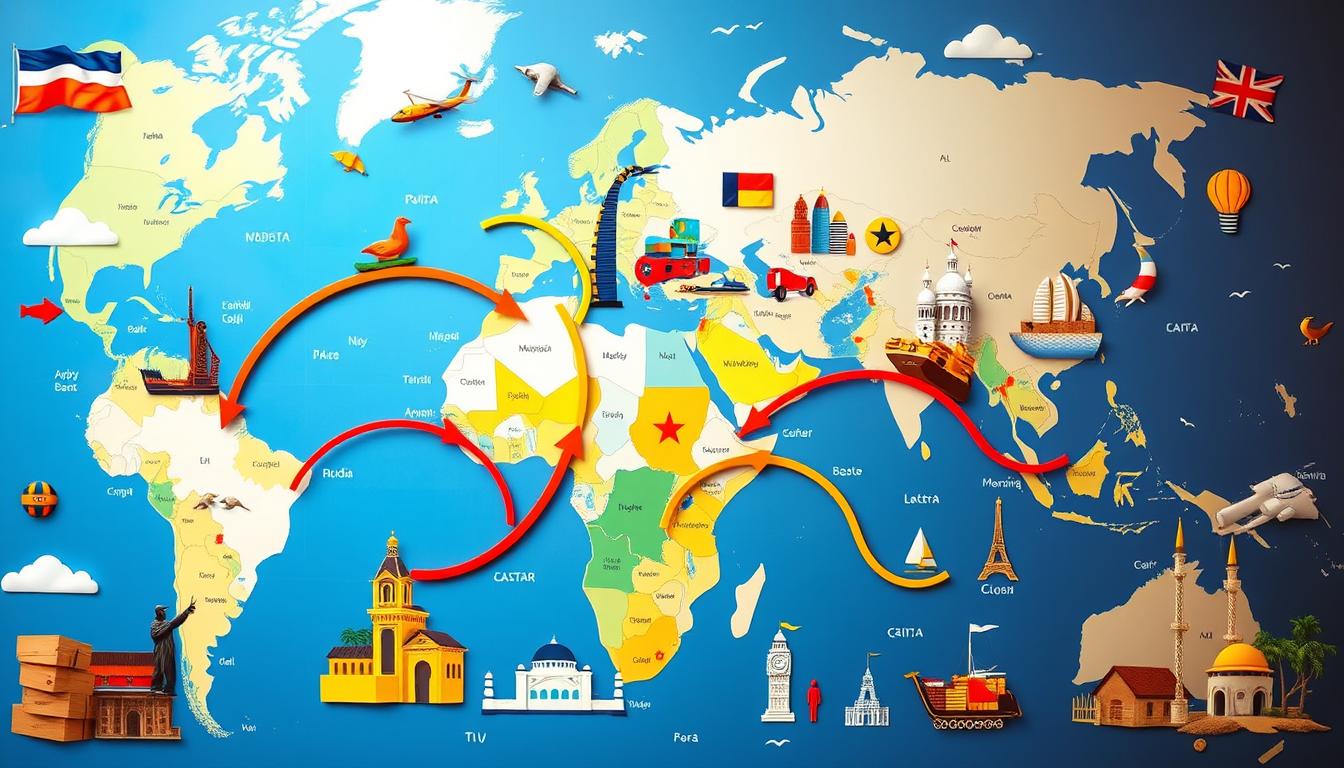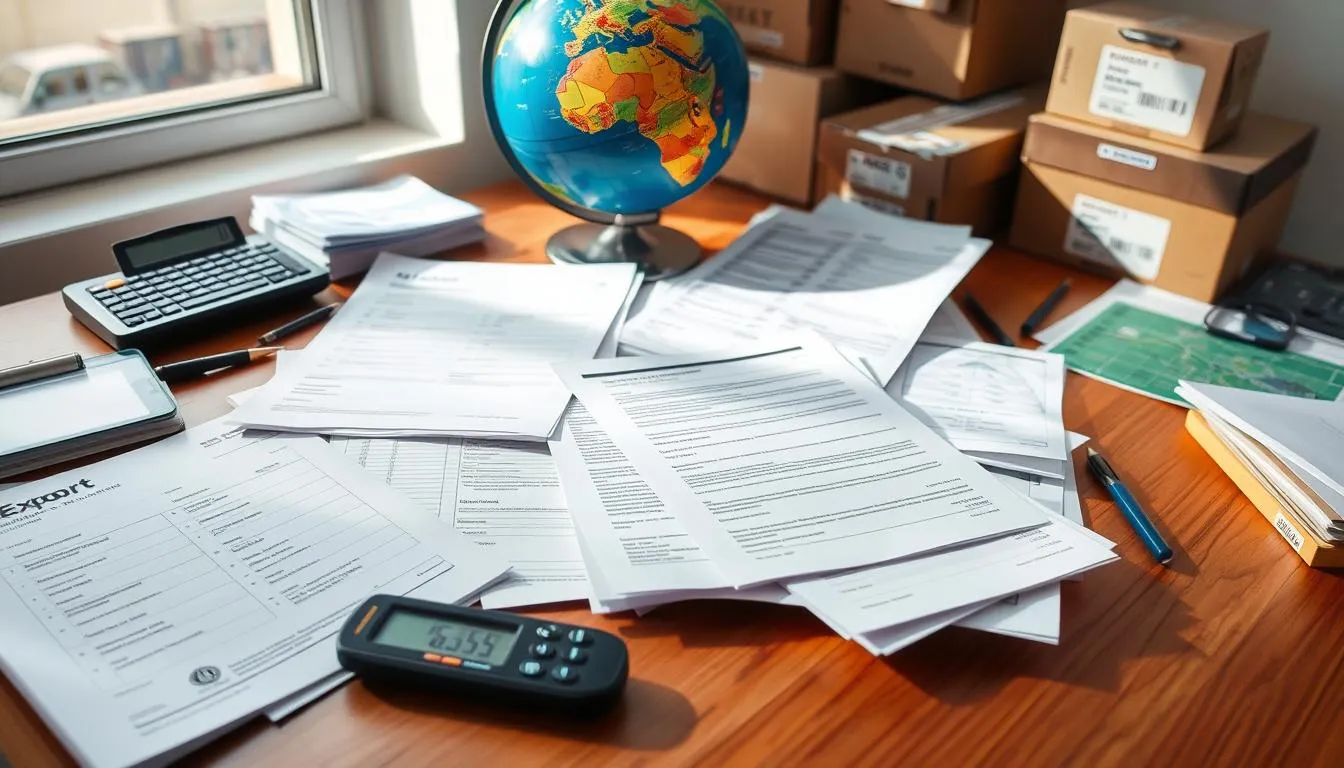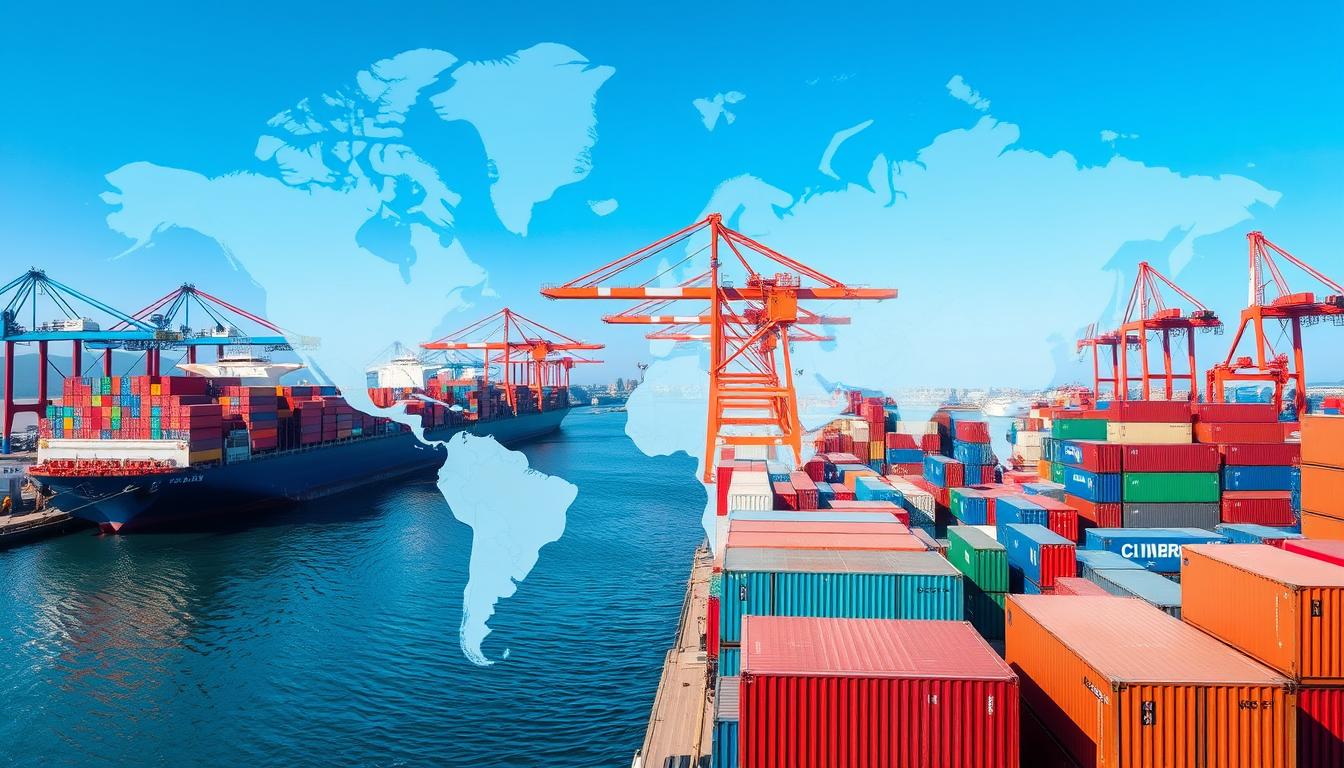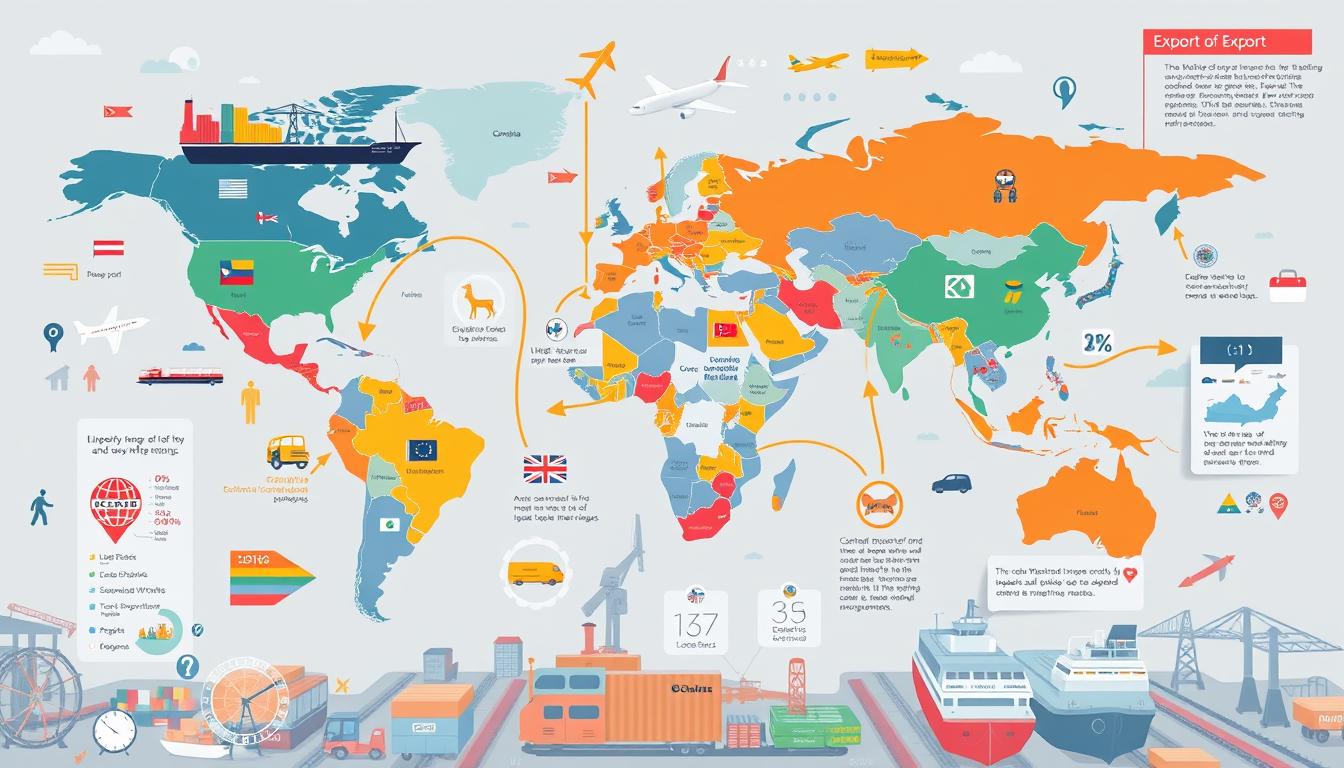How to Start Export Business: A Beginner’s Guide
Imagine your products or services going beyond borders. They reach people from all over the world. This is what the export business is all about. It’s a chance for entrepreneurs to grow and succeed globally.
But starting an export business can seem scary, especially if you’re new. Don’t worry, this guide will help you. It will show you how to start your own export business in India.
Key Takeaways
- Understand the basics of international trade and its main parts.
- Learn about the good and bad sides of exporting to make smart choices.
- Know the legal steps and how to register your export business.
- Find export markets and products that fit your skills.
- Learn how to do market research and analyze your competitors well.
Understanding the Fundamentals of Export Business
Starting an export business is exciting and rewarding. But, you need to know the basics of international trade. This part covers the main parts of export work, the good and bad sides, and the key skills for success worldwide.
Key Components of International Trade
Export business success depends on a few key things. You need to know about international trade regulations, handle complex logistics, and make good export marketing strategies. It’s important to understand customs policies, tariffs, and trade agreements to follow rules and avoid problems.
Benefits and Challenges in Export Operations
Export business has many benefits, like reaching more markets and making more money. But, there are also challenges like dealing with different cultures and languages, and changes in money values. Being flexible and careful is key in this changing world.
Essential Skills for Export Entrepreneurs
To do well in export business, you need special skills. Good communication, knowing about different cultures, and understanding global logistics are important. You also need to know about market research, money management, and how to handle risks in global trade.
| Skill | Description |
|---|---|
| Cross-cultural Communication | Ability to effectively interact with diverse international partners and customers, understanding cultural nuances and adapting communication styles accordingly. |
| International Logistics Management | Expertise in coordinating global supply chains, managing transportation, customs clearance, and distribution to ensure timely and efficient product delivery. |
| Financial Acumen | Proficiency in managing currency exchange risks, export financing options, and international payment methods to maintain financial stability and profitability. |
| Market Research and Analysis | Capacity to identify lucrative export markets, analyze competitor strategies, and understand consumer preferences in diverse global contexts. |
By learning these key skills, export entrepreneurs can handle the global market’s challenges. They can make their businesses successful for a long time.
Legal Requirements and Registration Process
Starting an export business in India is complex. You need to follow many legal steps. It’s important to know about export rules and legal stuff.
First, you must register your business. You need a Permanent Account Number (PAN) from the Income Tax Department. You also need to register with the Ministry of Corporate Affairs for a Certificate of Incorporation. If your business exports, you might need an Importer-Exporter Code (IEC) from the Directorate General of Foreign Trade (DGFT).
Next, you must learn about export documents. You’ll need licenses and permits, like an Export Promotion Council (EPC) registration. This lets you use export incentives. You also need to know about customs clearance and documents like the Bill of Lading and Commercial Invoice.
| Key Legal Requirements for Export Business in India | Description |
|---|---|
| Permanent Account Number (PAN) | A unique identification number issued by the Income Tax Department |
| Certificate of Incorporation | Obtained from the Ministry of Corporate Affairs to formally establish the business |
| Importer-Exporter Code (IEC) | A code issued by the Directorate General of Foreign Trade (DGFT) for international trade activities |
| Export Promotion Council (EPC) Registration | Provides access to various export incentives and schemes |
By carefully following export documentation requirements and export compliance and legal considerations, you can start your export business well. This careful planning helps avoid risks and sets your business up for success in international trade.
How to Start Export Business: Essential Steps and Requirements
Starting an export business is exciting and rewarding. But, it needs careful planning and attention to key steps. You’ll need licenses, a solid business setup, and a detailed export plan. This section will help you with these important steps for your export journey.
Obtaining Required Licenses and Permits
You must get the right licenses and permits before exporting. This includes company registration, an export license, and specific certifications. Learn about the export documentation needed in your target markets. This ensures you follow rules and export smoothly.
Setting Up Business Infrastructure
A strong business setup is key for export success. You’ll need an export department, export financing options, and logistics systems. Make sure your company has the right resources for international trade.
Creating an Export Business Plan
A detailed export business plan is vital. It should cover your strategy, markets, products, pricing, marketing, and finances. A good plan guides your decisions and measures your success.
“Successful exporting requires a strategic, well-planned approach that addresses the unique challenges and opportunities of global markets.”
By following these steps, you’ll start a thriving export business. It will handle international trade’s complexities and seize opportunities.
Identifying Profitable Export Markets and Products
Starting an export business means finding the right markets and products. You need to do deep foreign market research. Also, make sure your products meet global standards and rules.
Look at your current products and see if they can sell well abroad. Think about their special features, price, and how they compare to others. Pick products that will likely be liked by people in other countries and follow their rules.
- Do a lot of market research to find new trends, how people act, and chances to make money in different places.
- Check out who your competitors are and how your products compare to theirs.
- Make sure your products follow product compliance rules, like safety and labels, in the countries you want to sell in.
Choosing the right markets and compliant products can help you succeed worldwide. Making smart choices based on good research is key to a strong export business.
“The secret of getting ahead is getting started. The secret of getting started is breaking your complex overwhelming tasks into small manageable tasks, and then starting on the first one.”
International Market Research Strategies
Doing deep research on foreign markets is key for businesses wanting to grow worldwide. They look at where to sell, get to know local customs, and see what others are doing. This helps them make plans that fit what international buyers want.
Analyzing Target Markets
The first thing to do is check out possible places to sell. Look at who lives there, how much money they make, and how big the market could get. Also, see how easy it is to start a business there.
Understanding Cultural Differences
It’s very important to know the local ways and likes when you go into new markets. Look at customs, language, and how people do business. By matching your products and service to these, you can win over more customers.
Competitor Analysis in Global Markets
Knowing what your competitors do in foreign markets is also key. Look at what they sell, how much they charge, and how they get their products to customers. This helps you find where you can be different and stand out.
“Successful international market research is the foundation for building a thriving export business. By deeply understanding target markets, cultural nuances, and competitor activities, entrepreneurs can develop strategies that resonate with global customers and drive sustainable growth.”
Export Documentation and Compliance Requirements
International trade is complex. You need to pay close attention to export documents and rules. Knowing these well can help you succeed globally.
Customs Clearance Procedures
Exporting goods starts with customs clearance. You need to get the right documents like a commercial invoice and bill of lading. Each country has its own rules, so it’s important to follow theirs.
Essential Export Documents
- Commercial Invoice: A detailed invoice that outlines the items being exported, their value, and other relevant information for customs authorities.
- Packing List: A detailed list of the contents of each package or container being shipped.
- Bill of Lading: A document that serves as a contract between the shipper and the carrier, outlining the terms of the transportation of goods.
- Certificate of Origin: A document that certifies the country of origin of the exported goods.
Regulatory Compliance
Some goods need extra documents for export. This includes licenses and permits. Knowing these rules helps avoid problems.
| Document | Purpose |
|---|---|
| Export License | Required for the export of certain controlled or restricted goods, such as military equipment or dual-use items. |
| Shipper’s Export Declaration (SED) | A document that provides detailed information about the exported goods, used for statistical purposes. |
| Letter of Credit | A payment mechanism used in international trade, where the buyer’s bank guarantees payment to the seller upon presentation of required documents. |
Export rules can be hard to follow. But with the right info, you can avoid problems. Staying updated helps your business grow globally.
Building International Business Relationships
Building strong international business relationships is key to success. It opens doors to new markets and opportunities. It helps create a global business that lasts.
Finding Reliable Foreign Buyers
Finding trustworthy buyers is vital. Use online platforms, trade shows, and export agencies to find them. Building personal connections helps a lot.
Networking in International Trade Shows
Trade shows are great for meeting buyers and suppliers. They let you show your products and learn about markets. Good networking can lead to great partnerships.
Developing Strong Supplier Relationships
Good supplier relationships are crucial. Trust, communication, and mutual benefits are key. Regular visits and problem-solving help build strong chains.
| Strategies for Finding International Buyers | Benefits of Networking at Trade Shows | Keys to Developing Strong Supplier Relationships |
|---|---|---|
|
|
|
By using these strategies, entrepreneurs can grow their business. They can find new customers and build strong supply chains. This is key for success in the global market.
Global Logistics and Supply Chain Management
Running a successful export business means knowing global logistics and supply chain management. You need to understand shipping methods and customs clearance well. This helps your products get to customers fast and without spending too much.
Choosing the right shipping is crucial. You must think about how long it takes, the cost, and what you’re shipping. You might use air freight, sea freight, or both. Working with logistics providers can make your supply chain better and more reliable.
Knowing customs clearance rules is also key. You need to know the documents, tariffs, and rules of the country you’re shipping to. Working with customs brokers can make this easier and help you follow trade rules.
Improving your global logistics and supply chain can make your business better. It can make you more competitive, save money, and make customers happier. Spending time and money on this can really help your business grow.
“Effective global logistics management is the key to unlocking the full potential of your export business.”
Financial Management and Payment Methods
Export finance and international payments are key for global business growth. Whether big or small, knowing export financing options and international payments is vital. It can mean success or failure in the global market.
International Payment Terms
International trade payment terms differ from local ones. Business owners need to learn about letters of credit, bank transfers, and digital payments. It’s important to get good payment terms from buyers to get paid on time.
Managing Currency Risk
Exchange rate changes can hurt export profits. Smart exporters use forward contracts, currency hedging, and local currency invoicing. These methods help manage international payments risks.
Export Finance Options
Finding the right funding is key for export success. Entrepreneurs can look at export financing options. This includes government programs, export credit insurance, and loans for international businesses.
| Export Financing Option | Key Benefits |
|---|---|
| Government-backed Trade Financing | Competitive interest rates, risk mitigation, and access to international markets |
| Export Credit Insurance | Protection against non-payment, political risks, and other export-related challenges |
| Working Capital Loans | Flexible financing to support inventory, receivables, and other export-related expenses |
Understanding and managing export finance is crucial for Indian entrepreneurs. It helps them succeed globally.
Marketing Strategies for Export Business
Going global can be thrilling for businesses. But, you need a good export marketing strategy to do well. There are many ways to reach and connect with buyers from other countries.
Knowing what your target markets like is key. Do lots of market research. This helps you understand their culture, shopping habits, and who they compete with.
Then, use this info to make marketing that speaks to them. This way, your message will really hit home.
Digital marketing is a big help in finding international buyers. Use SEO, social media, and email to get noticed online. Make sure your content is interesting and fits the local taste.
Branding is also super important. A strong brand that works worldwide can make you stand out. Make sure your brand looks and feels right for your target markets.
Going to trade shows and networking events is smart too. These places let you show off what you offer. You can meet new partners and learn about the latest in your field.
| Export Marketing Strategies | Key Considerations |
|---|---|
| Digital Marketing |
|
| Branding |
|
| Trade Shows and Networking |
|
With a smart export marketing plan, you can find buyers who fit what you offer. This way, you can succeed in the global market.
“Successful export marketing is not just about selling to foreign markets, but about understanding and adapting to the unique needs and preferences of each target audience.”
Conclusion
The world of export business is full of chances for brave entrepreneurs in India. You can learn about international trade, follow the law, and plan well. This helps you succeed globally.
Starting an export business has its tough parts. But, with the right skills and hard work, the benefits are huge. You can make more money, reach more customers, and stand out from others.
If you want to grow your business worldwide, this guide is for you. It gives you the key info and steps to start an export business. Now, it’s time to take the first step and start your own international trade journey.
FAQ
What are the key components of international trade?
Key parts of international trade include knowing global rules and finding export chances. It also means dealing with global trade’s complexities, managing logistics, and marketing abroad.
What are the main benefits and challenges of starting an export business?
Starting an export business can open up new markets and increase profits. But, it also comes with challenges like dealing with complex rules, managing logistics, and adapting to different markets.
What are the essential skills required for export entrepreneurs?
Good export entrepreneurs know how to research markets, understand cultures, and plan strategies. They also manage logistics, finances, and communicate well with people from other countries.
What are the legal requirements and registration process for starting an export business in India?
To start an export business in India, you need licenses and to register with authorities. You must follow export rules and prepare the right documents for international trade.
How can entrepreneurs identify profitable export markets and products?
To find good markets and products, do deep market research. Look at demand, competition, and if products meet market needs. Understanding trends and what customers want is key.
What international market research strategies should export businesses employ?
Good market research includes studying demographics, economy, and trends in target markets. It’s also about understanding cultural differences and analyzing competitors.
What are the key export documentation and compliance requirements?
Key documents include export licenses and shipping papers. You must also ensure products meet global standards and clear customs in both your country and abroad.
How can export businesses build strong international business relationships?
To build strong relationships, find reliable buyers and network at trade shows. Develop partnerships with suppliers and work towards long-term collaborations with global partners.
What are the critical aspects of global logistics and supply chain management for export businesses?
Important logistics and supply chain aspects include choosing the right shipping methods and managing distribution networks. You also need to navigate customs and manage inventory and transport to deliver products efficiently.
What financial management and payment methods are important for export businesses?
Important financial aspects include understanding payment terms, managing currency risks, and using export financing. You also need secure payment systems for international transactions.
What marketing strategies are effective for export businesses?
Good marketing includes building a strong global brand and using digital marketing for international markets. Participate in trade shows and build lasting relationships with buyers and distributors.
Akash verma s blog, where curiosity meets creativity! Sanjeet is a dedicated blogger with a passion for exploring diverse topics, from travel and technology to personal development and lifestyle. With a unique voice and engaging storytelling, he shares insights, experiences, and tips that inspire his readers to embrace life’s adventures.




